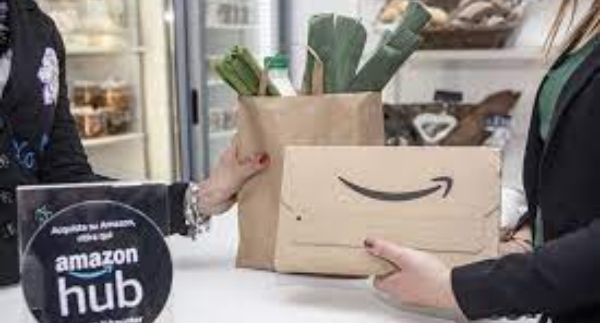Why and how Amazon Counter could be good for the world
If it re-done right, that is.

Back in early 2020 (*), a friend of mine asked online what people thought about Amazon Counter. My first reply greatly surprised him, because he knows my opinions about Amazon, and that reply started with:
“This really sounds like a consumer’s dream, and a green one too."
The conversation continued as follows (edited for clarity).
Friend: Did you call it green because it would enable ‘cosmo-local’ production, that is small-scale manufacturing of products designed once and then reused globally?
Me: Let’s look at my FULL initial reply:
“This really sounds like a consumer’s dream, and a green one too[, because, if] Amazon Counter became the worldwide unified way to deliver both local and remotely sourced goods, it may keep both remote villages and historic city centers alive."
Before cosmo-local production, I argue that a system like that would enable cosmo-local integrated delivery first. And that, in my opinion, may help a lot local producers of certain goods, who today are crushed by big supermarkets belonging to multinationals, to survive.
This would also allow people to keep using the many things that in a modern society still cannot be produced locally, in small batches. Not in the current reality, that is. See “comments to case study 1” in (even truer now than 12 years ago when I wrote it) my Thoughts on Peer to Peer production and deployment of PHYSICAL objects.
In practice, if Amazon became the SLOW standard that I suggest, I could buy a new motherboard for my computer, or a new Arduino controller (both made in China with chips made in Malaysia… because HIGH volume production is the only way to make it affordable), a hand-made eco-leather wallet from an artisan in Florence, and fresh vegetables from a cooperative 15 km from home, but:
- all in one order, from the same interface, with only one payment
- have all delivered to the nearest counter (or to my door, paying extra? All by ONE drone?) as one bundle
- without nobody like Amazon controlling my whole life, or abusing of its monopoly position, discriminating with selective pricing etc…
- with the smallest possible amount of CO2, steel, energy etc… consumed to MOVE all this stuff from their suppliers to me.
This, in cities. In villages, this may also be the only way to keep them alive. It would give both to senior citizens who cannot drive or walk long distances, and to young couples with kids but no car, all they need to live a decent life without being forced to move or stay in the city.
If it becomes an international, non-proprietary standard like normal mail, that is.
(*) the original conversation happened in January 2020. I immediately saved it, as the basis for a blog post, but for some reason I completely forgot to do it until today. Never minds, it’s still relevant. Maybe even more, considering the current status of global supply chains)
Who writes this, why, and how to help
I am Marco Fioretti, tech writer and aspiring polymath doing human-digital research and popularization.
I do it because YOUR civil rights and the quality of YOUR life depend every year more on how software is used AROUND you.
To this end, I have already shared more than a million words on this blog, without any paywall or user tracking, and am sharing the next million through a newsletter, also without any paywall.
The more direct support I get, the more I can continue to inform for free parents, teachers, decision makers, and everybody else who should know more stuff like this. You can support me with paid subscriptions to my newsletter, donations via PayPal (mfioretti@nexaima.net) or LiberaPay, or in any of the other ways listed here.THANKS for your support!